Hair Loss Caused by Stress
Chronic, short-term, and emotional stress can wreak havoc on our physical and mental well-being. Though hair loss does not always accompany times of stress, it is a common occurrence and can cause feelings of frustration for many. Thankfully, stress-induced hair loss is often temporary and will improve once the stressor has ceased. It is essential to seek treatment as soon as hair loss occurs, as the faster the cause of the hair loss is addressed, the better the treatment outcomes. Dr. Michele Green in NYC often sees patients with thinning hair after experiencing stressors or an unexpected stressful event and uses the most innovative treatment options to stop hair loss and promote regrowth.
Stress-related hair loss can present in various ways. Telogen effluvium is one of the most common types of hair loss and is caused by hair follicles undergoing an extended resting phase, resulting in diffuse hair shedding. Alopecia areata is another type of stress-related hair loss that occurs when the immune system attacks the hair follicles, resulting in patchy hair loss. Trichotillomania, while less common, is a stress-related hair loss disorder characterized by a strong urge to pull out one’s hair. A combination of topical therapies, oral medication, and platelet-rich plasma injections is often best to treat stress-related hair loss and improve hair health, density, and growth. If you’re struggling with increased hair shedding due to chronic stress, board-certified dermatologist Dr. Michele Green is here to help.
Dr. Michele Green is an internationally renowned board-certified dermatologist with over two and a half decades of experience providing her patients with the most innovative treatment options to treat hair loss and stress-related hair loss. She is consistently identified as one of New York’s best dermatologists by Castle Connolly, New York Magazine, Super Doctors, and The New York Times for her dedication to her patients and expertise. When you consult with Dr. Green at her private dermatology office in Manhattan’s Upper East Side neighborhood, she will work with you to diagnose and treat your hair loss with the best in-office procedures and oral and topical treatment options to achieve thicker, healthier hair that lasts.
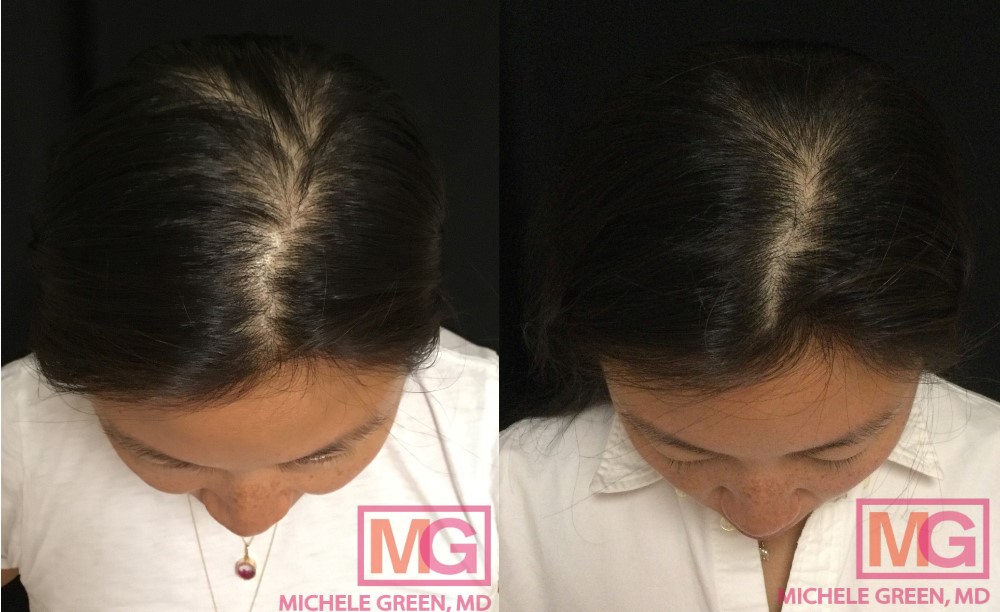
2 months, three sessions of PRP hair treatment
Will stress cause hair loss?
Yes, chronic or emotional stress can cause hair loss or hair thinning; however, this does not mean everyone who endures stress will develop hair loss. Stress-induced hair loss commonly occurs in patients who experience a stressful event, such as an injury, a difficult recovery from illness, losing a loved one, divorce, or another form of chronic stress that affects their overall well-being. These major stressors or stressful events can result in increased systemic levels of stress hormones, which prematurely force hairs out of the anagen or growth phase and into the telogen or resting phase of hair growth. Stress-related hair loss typically begins two or three months after a significant stressor or stressful event. Luckily, many patients who experience stress-related hair loss find it temporary, and hair will often grow back after the stress has been managed. As it can take a while for hair to grow back, hair restoration treatments such as platelet-rich plasma (PRP) injections, oral medications, and topical therapies can be used to help thicken and regrow hair.
Why does stress cause hair loss?
There are four distinct phases in the natural hair growth cycle: anagen, catagen, telogen, and exogen. The anagen phase is also known as the growth phase, and it allows the hairs to develop over two to 6 years, depending on the hair follicle. Most of the hair on the scalp is in the anagen phase. The next phase, the catagen phase, is a brief transitional phase that typically lasts ten days. During the catagen phase, hair stops growing and detaches from the hair follicle. The telogen phase is a resting phase that lasts a few months, during which the strands remain in the hair follicle but are no longer actively growing. The telogen phase typically lasts between 2-3 months. Lastly, the exogen phase occurs when the strand is finally released from the follicle and falls out, restarting the hair growth cycle. Disruption in the natural hair growth cycle can cause devastating effects, including significant hair shedding or patchy hair loss.
Typically, when stress leads to thinning hair, this indicates that the hair growth cycle has been disrupted. Chronic stress can increase the body’s cortisol levels, affecting various aspects of regular activity in the hair follicles and resulting in hair loss. One of the effects is an increase in the number of hair follicle stem cells entering a dormant stage, which can lead to a large amount of hair shedding all at once. Many different stressors can cause this shift in the body, including hormonal changes such as postpartum shifts or menopause, as well as emotional stress. If you have observed increased hair shedding, diffuse thinning hair, or patchy hair loss, schedule a consultation with board-certified dermatologist Dr. Michele Green, who can help diagnose and properly treat the type of hair loss you have.
What does stress hair loss look like?
Telogen Effluvium
Telogen effluvium is a shift of many hairs into the telogen phase, resulting in abrupt, diffuse shedding of scalp hair. Symptoms of telogen effluvium typically won’t present until two or three months after a stressful event or chronic stress, after which hairs in the telogen phase will be released from the hair follicle and induce shedding. Patients often observe diffuse hair loss caused by telogen effluvium as “en-mass” hair shedding, appearing as overall hair thinning or hair loss rather than a widening part or gradual thinning in specific areas. Oftentimes, patients will notice a substantially thinner ponytail or an increase in the amount of hair shed while combing or shampooing as an indicator of telogen effluvium. The average person with healthy hair follicles will shed between 100-200 hairs daily, but the increase in hair shedding during telogen effluvium can result in more than 50% of hairs shed on the head.
Telogen effluvium is the most common form of stress-related hair loss. Common causes of telogen effluvium include chronic or emotional stress, serious illnesses, childbirth, extreme dieting or weight loss, medication, illness, nutritional deficiencies, withdrawal of hormonal therapy, or surgery. Thankfully, telogen effluvium is a temporary hair loss that does not lead to baldness. Though the initial hair loss can last several months, many patients find that their hair volume and health will return to what they were before the hair shedding began after the stressor was removed. Nevertheless, this natural regrowth can be arduous, as hair typically grows about a half inch in length per month. Additionally, telogen effluvium can expose other subtle hair loss issues, such as female pattern baldness, and can, in rare cases, lead to further hair thinning or chronic hair loss. For this reason, it’s best to treat hair loss due to telogen effluvium when symptoms are visible to restore the health of the hair follicles as they re-stimulate hair growth within the natural hair cycle.
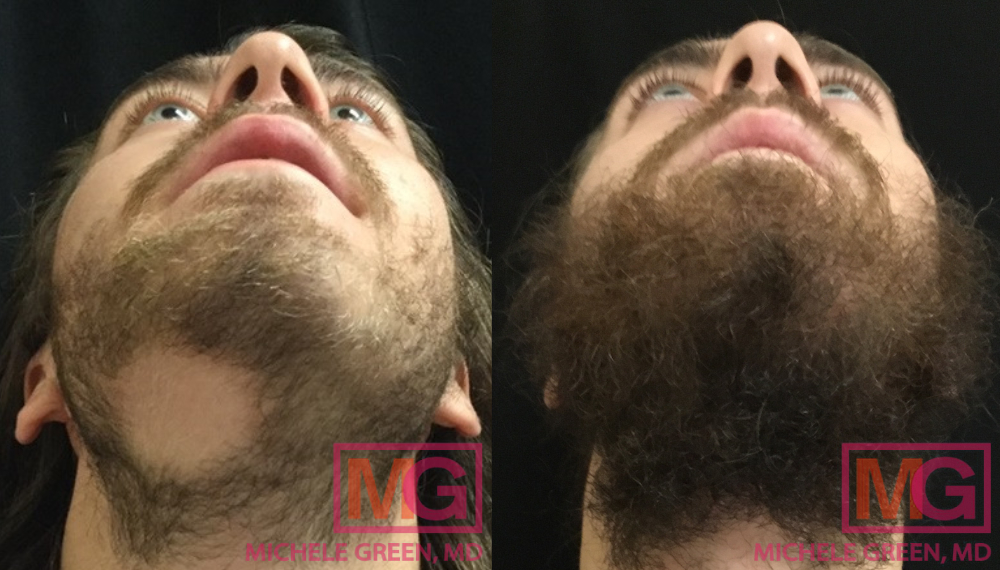
Alopecia Areata
Alopecia areata is an autoimmune disease during which the immune system starts to attack the hair follicles, leading to increased hair loss. Alopecia areata is often triggered by stress and leads to unpredictable hair loss in circular, non-scarring patches along the scalp. Alopecia areata affects patients from adolescence well into adulthood and typically is indicated through patchy hair loss, with bald patches that are typically about the size of a quarter. It can be triggered by various factors, including genetic predisposition and stress, and sometimes progresses to complete hair loss on the head. The hair may go through phases of regrowth and hair loss over an extended period. In rare cases, alopecia areata can lead to hair loss all over the body, known as alopecia totalis. When treating alopecia areata, Dr. Green tailors a treatment plan that combines intralesional cortisone treatments, topical therapies, and platelet-rich plasma (PRP) injections for optimal hair restoration.
Trichotillomania
Trichotillomania is a hair-pulling disorder that can lead an affected person to break off, pull out, or twist out hairs from the head, eyelashes, eyebrows, and the chin, chest, leg, or underarm regions of the body. Patients may experience relief from emotional stress following an episode of hair-pulling and have difficulty ceasing the behavior. Trichotillomania is classified as a mental disorder along the spectrum of obsessive-compulsive disorder that affects the patient’s daily life and leads to a noticeable amount of hair loss. Trichotillomania is thought to be caused by various biological, behavioral, and psychological factors, and there is an increased risk of trichotillomania found in patients with a relative suffering from the condition. It is often linked to other psychiatric conditions, including but not limited to depressive disorders, excoriation, and Tourette’s syndrome. Trichotillomania often develops in adolescents and can continue until adulthood, affecting around 1-2% of the population. As the visible symptoms of trichotillomania often resemble alopecia areata or telogen effluvium, a psychologist or a veteran dermatologist must diagnose the condition. An experienced medical professional, such as board-certified dermatologist Dr. Michele Green, can physically assess the scalp and hair to help diagnose the type of hair loss and best treat it.
How long does stress hair loss last?
Stress-related hair loss typically begins two to three months after a significant stressor or stressful event. Once feelings of stress are under control, hair shedding may continue for up to six months or, in some cases, continue for years. Stress-related hair loss is usually not permanent for everyone who experiences it; however, practicing stress management techniques and consulting with a board-certified dermatologist, such as Dr. Michele Green in NYC, can help stop hair loss. Dr. Green recommends various treatment options, including PRP injections, topical treatments, oral medications, and supplements that can help promote regrowth.
Can hair loss from stress grow back?
After experiencing hair shedding or balding from stress, many patients ask, “Will hair loss from stress grow back?” The degree to which the hair grows back will depend on the hair loss type. For most patients, hair will regrow after the stress is removed. Patients often find that their hair can be restored to its former glory, although it can take many months for the hair loss to cease and hair growth to begin.
How to stop hair falling out from stress
Dr. Green uses her expert knowledge to cull from various treatment options that stimulate hair growth. These treatment options include topical over-the-counter treatments such as Rogaine (minoxidil), oral medications like spironolactone, oral minoxidil, dutasteride, finasteride, and certain hormonal medications (such as birth control), and platelet-rich plasma injections. When you work with Dr. Green, she can accurately assess your current hair loss needs, discuss your medical history, and determine the best treatment plan. Typically, patients rely on a unique combination of various treatment options that, when combined, prevent or delay hair loss and create healthy new hair growth.
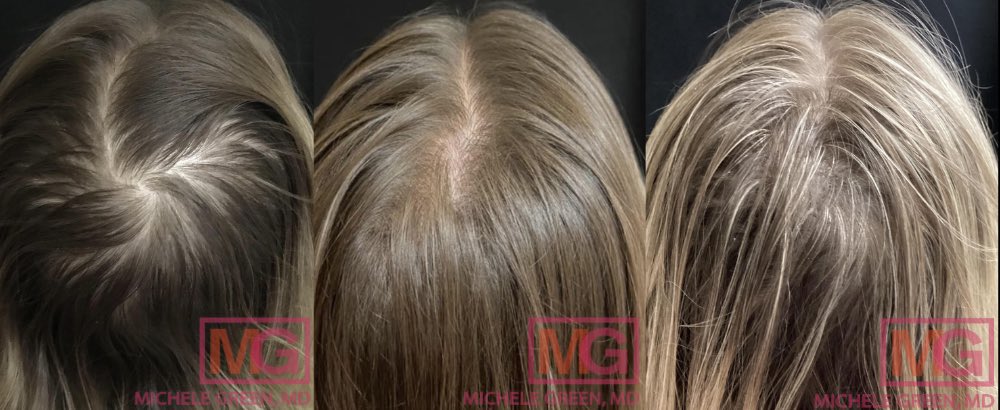
Before and after 3 and 5 sessions of PRP, 6 months then 14 months
How to reduce hair loss from stress: Platelet-rich plasma injections
Platelet-rich plasma (PRP) injections are one of the most popular in-office treatment options for hair restoration. PRP is an innovative, in-office treatment that relies on your body’s growth factors and nutrients to stimulate healthy hair follicles and produce new hair growth. PRP is derived from a sample of the patient’s blood, which is placed safely in a centrifuge to create a concentrate rich in growth factors such as Platelet-Derived Growth Factor, Transforming Growth Factor Beta, and Epidermal Growth Factor, among others. These growth factors can boost blood vessels, cells, and skin regeneration and growth, nourishing and supporting the hair follicle. Typically, a treatment session for PRP hair restoration takes around a half hour, and patients can resume regular activity after the procedure. Most patients require an initial short series of four treatment sessions, each spaced approximately one month apart, to achieve optimal results. Patients often engage in maintenance sessions to enhance treatment results and restore their hair to its former glory.
How to stop balding from stress: Intralesional corticosteroid injections for Alopecia Areata treatment
Intralesional corticosteroid injections are the most effective method for treating bald patches due to alopecia areata. Corticosteroids are anti-inflammatory medications that prevent the immune system from attacking hair follicles. During treatment, the corticosteroids are injected directly into the individual bald patches. Treatment is not painful, and patients can resume their daily activities immediately afterward. Intralesional corticosteroid injections have proven to be an incredibly effective treatment option for alopecia areata, with clinical studies reporting that 71% of patients experienced hair regrowth just 12 weeks after intralesional cortisone injections (doi: 10.1111/j.1365-2133.1973.tb06672.x). Patients often require several treatment sessions spaced three or more weeks apart for optimal hair regrowth. When you consult with Dr. Green, she will assess your hair loss and response to treatment with each visit to determine how many sessions may be necessary.
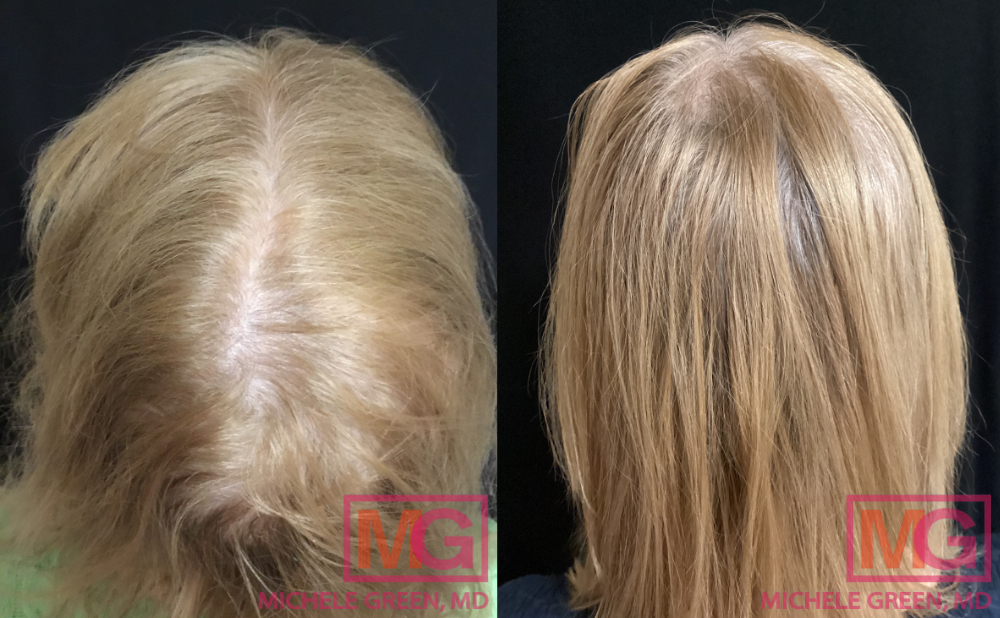
How to stop hair thinning from stress: Topical and oral medications
Topical treatments for hair loss can be essential in preventing new loss and stimulating hair regrowth. Minoxidil is the only FDA-approved topical treatment for combating hair loss and can help regenerate new hair. Minoxidil is available over the counter as a solution or foam base, which should be applied to the scalp at bedtime. Minoxidil can complement PRP hair treatments or oral medications and can be used long-term to sustain the results achieved from PRP. Dr. Michele Green’s proprietary line of skin care products, MGSKINLABs, Inc., carries two specially formulated minoxidil serums: The Revitalizing Hair Serum for Men contains 7% minoxidil compounded with 0.1% finasteride and The Revitalizing Hair Serum for Women contains 7% minoxidil compounded with 0.1% progesterone.
Depending on the underlying factors contributing to your hair loss, Dr. Green may recommend taking an oral medication to cease hair shedding and promote new hair growth. Some of the most commonly prescribed oral medications for hair loss include:
- Finasteride (Propecia) is an FDA-approved oral medication for treating androgenetic alopecia (male-patterned baldness). DHT (dihydrotestosterone) is a male androgenic hormone that has been shown to impact hair follicles and induce hair follicle miniaturization. Finasteride is a 5-alpha-reductase inhibitor that helps reduce hair loss by blocking the action of converting testosterone into dihydrotestosterone (DHT), lowering the DHT levels in the body, slowing hair loss, and promoting new hair growth. Propecia effectively treats both men and postmenopausal women with hair loss and thinning hair.
- Oral Minoxidil is a medication that was initially prescribed for hypertension until researchers discovered that one of the side effects of taking low-dose oral minoxidil was new hair growth. Oral minoxidil is a relatively new treatment option for hair loss, and its mechanism of action against hair loss is still not entirely understood. Some research has indicated that oral minoxidil promotes increased blood circulation to the scalp, providing more oxygen and nutrients and increasing hair follicles’ health. Oral minoxidil may also promote an extended growth phase during the natural hair growth cycle. Other studies have indicated that oral minoxidil regulates components of the immune system that may be associated with autoimmune-related hair loss. Patients who can not tolerate the topical version of minoxidil due to skin irritation can take advantage of the convenient oral form.
- Dutasteride, like finasteride, treats hair thinning and loss by inhibiting the conversion of testosterone to dihydrotestosterone (DHT). DHT is an androgen hormone that plays a role in developing male sex characteristics such as facial and body hair. It can also potentially bind to androgen receptors in the scalp, causing the hair follicles to cease producing new hair. Although dutasteride has yet to be approved by the FDA, recent clinical studies demonstrate its benefits as a hair loss treatment.
- Spironolactone is an FDA-approved anti-androgen medication that treats female hair loss by regulating androgen hormones. Fluctuations of androgen hormones in the body can trigger hair loss and thinning hair, and keeping levels regulated can combat this condition. Spironolactone is an oral treatment option reserved for female patients, as it may cause unwanted side effects in male patients. A board-certified dermatologist must monitor treatment with spironolactone so that adjustments can be made as necessary since some of the potential side effects include depression, fatigue, weight gain, and sexual dysfunction.
Vitamins to supplement stress-related hair loss treatments
Nutrafol is an all-natural supplement clinically proven to restore hair growth. Nutrafol is available as an oral supplement and a topical vitamin-enriched solution to stimulate hair growth. The vitamins and nutrients in Nutrafol’s proprietary blend combat various causes of hair loss. For example, the saw palmetto found in Nutrafol helps prevent the conversion of the male androgen hormones into DHT (dihydrotestosterone), which is responsible for baldness. Viviscal is a supplement formulated with essential vitamins such as Biotin, Vitamin C, and B Vitamins, as well as other proprietary vitamins clinically proven to thicken and help hair growth. Patients with hair loss associated with nutritional deficiencies or anemia may benefit from taking vitamins such as iron or biotin, available over the counter. Before beginning an oral supplement for hair loss, it is recommended to consult with a board-certified dermatologist, such as Dr. Michele Green in NYC.
Is hair loss from stress permanent?
Many patients ask, “Is hair thinning from stress permanent?” Most cases of stress-related hair loss are only temporary, although it can take several months for hair shedding to cease. Patients can often restore their hair through simple measures such as stress management and an improved diet. Though not every patient can prevent further hair loss due to stress, many can nourish hair follicles and encourage hair regrowth through targeted treatments like PRP injections and oral medications.
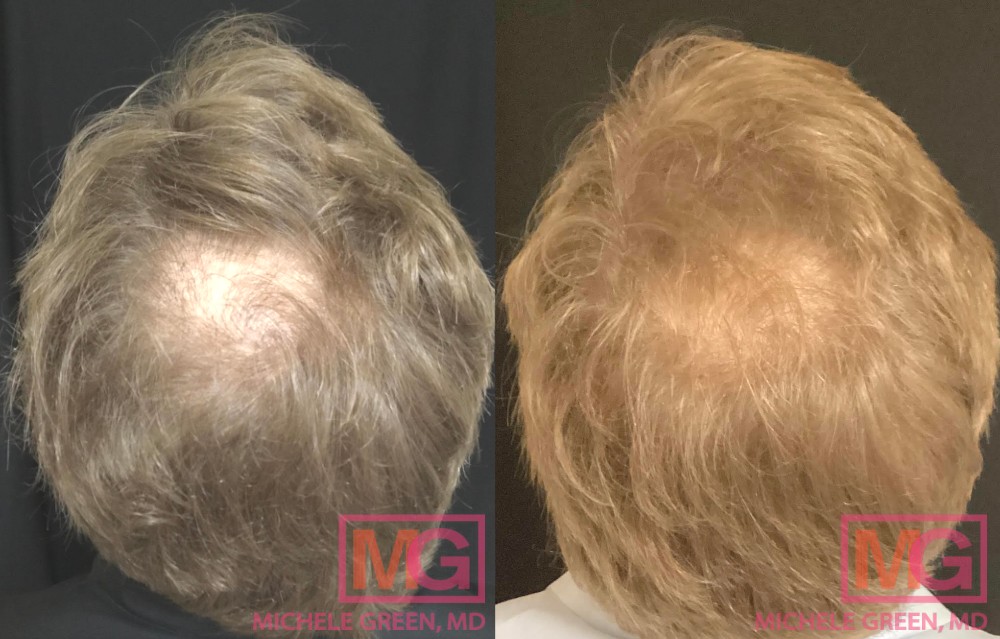
Is hair loss a sign of stress?
Hair loss and thinning can be a sign of stress. Rapid, excessive shedding is often a sign of stress-related hair loss and telogen effluvium. The appearance of bald patches on the scalp or other body areas can indicate alopecia areata triggered by stress. However, many other underlying conditions or external factors may be associated with hair loss. Autoimmune conditions, thyroid disorders (overactive and underactive thyroid), pregnancy, certain hairstyles, inflammatory skin conditions (seborrheic dermatitis and psoriasis), anemia, certain medications (antidepressants, weight loss medications), and polycystic ovarian syndrome can all cause thinning hair or hair loss. If you have observed patchy hair loss, diffuse thinning hair, or an increased number of strands of hair fall per day, schedule a consultation with an expert, such as board-certified dermatologist Dr. Michele Green. Dr. Green is an expert in hair loss and an internationally recognized dermatology leader with over 25 years of experience. Dr. Green will help you diagnose your type of hair loss and effectively treat it.
Does stress cause hair loss?
Patients often ask, “Does stress really cause hair loss? The answer is yes; chronic stress, emotional stress, and physical trauma may result in hair loss. Cortisol is a stress hormone that plays a large role in the body’s natural “fight or flight” response — increased cortisol levels can push hair follicles from the growth phase to the dormant phase of the hair growth cycle, resulting in large hair shedding. High cortisol levels may also damage molecules essential for proper hair follicle activity (https://pubmed.ncbi.nlm.nih.gov/28249276/). For most men and women, hair loss associated with trauma or stress is a temporary condition that resolves within several months. If an unexpected traumatic event has resulted in thinning hair or hair loss, schedule a consultation with board-certified dermatologist Dr. Michele Green. Dr. Green has over 25 years of experience treating stress-related hair loss and can provide the treatment options best suited to your needs. During your initial hair loss consultation with Dr. Green at her private dermatology office in Manhattan’s Upper East Side neighborhood, you will have the opportunity to discuss with her in-depth your medical history, family history of hair loss, and factors such as stress levels, hair styling practices, diet, and more. Once the cause of your hair loss is determined, she will create a customized treatment plan to restore your hair to its former glory.
What is the difference between stress-related hair loss and male or female pattern hair loss?
Stress-related hair loss is hair shedding, thinning, or balding due to a stressor or major stressful event. Hair loss due to stress can appear as diffuse shedding across the scalp (telogen effluvium) or discrete bald patches (alopecia areata). In the case of trichotillomania, patients may pull out or break their hair strands to experience relief. Typically, stress-related hair loss disappears once the stress is removed. Androgenetic alopecia, referred to as male-pattern baldness in men and female-pattern baldness in women, is one of the most common types of hair loss. This form of hair loss leads to thinning hair and receding hairlines due to a lack of new hair growth during the anagen phase of the hair growth cycle. Androgenetic alopecia occurs due to genetics but can be accelerated by hormone fluctuations, stress, or medical conditions. Androgenetic alopecia does not go away on its own and must be treated with medical intervention to mitigate hair loss. Treatments for stress-related hair loss and male or female pattern hair loss are often the same, utilizing a combination of topical minoxidil, oral medications, and PRP treatments to promote hair retention and growth.
How to stop stressing about hair loss
Any hair loss can induce frustration, low self-esteem, and stress. Finding healthy ways to manage stress to reduce further exacerbation of hair loss is essential. Utilizing stress management methods, including exercise, medication, deep breathing, yoga, mindfulness, or a new hobby, can help reduce stress levels and the worsening of stress-related hair loss. In addition to finding preferred practices for stress management and engaging in proper hair care, the best way to reduce stress-related hair loss is by consulting with an expert, such as board-certified Dr. Michele Green. She can create a tailored treatment plan combining PRP injections, topical treatments, and oral medications to speed up hair regrowth and reduce stress.
Will hair loss due to stress grow back?
Hair loss due to a stressor or stressful event can be incredibly frustrating to experience, and many patients often have one question on their mind: “Will hair grow back after stress?” For most patients, hair will grow back after the stress is removed. Stress-related hair loss typically begins two or three months after the initial stressor, such as divorce, major surgery, or the death of a loved one. Hair loss can result in excessive, rapid shredding or bald patches on the scalp. Once the stress is removed, it may take up to six months or more for the hair to grow back. As the hair grows, many patients find that it can be restored to its former glory. However, some patients may not see hair growth for years, while others may be in a situation where the stressor cannot be removed completely. The best way to regrow hair and reduce stress-related hair loss is to consult an expert, such as board-certified dermatologist Dr. Michele Green. Dr. Green has over two and a half decades of experience diagnosing and treating various types of hair loss and incorporates the most cutting-edge treatment options into the customized treatment plans of her patients. She will work with you to develop a personalized treatment plan for your hair loss that caters to your specific needs and the type of hair loss you have for healthier, thicker, and fuller hair.
How to reverse stress hair loss today
Stress-related hair loss, while temporary for most, can take several months to resolve and exacerbate feelings of emotional stress. Though there is no one-stop solution to hair loss or thinning hair, strategies can make a difference when reducing stress-related hair loss. Dr. Green always recommends that her patients examine their lifestyles to reduce stressors and develop stress management solutions that work for their lifestyles. Eating a balanced diet, getting enough sleep each night, and avoiding damaging hair styling tools are all critical components in restoring healthy hair and maintaining new hair growth. In addition, treatment options, such as PRP injections, topical minoxidil, and oral medications, can help speed hair regrowth, thicken hair, and reduce hair shedding. When you consult with Dr. Green, she will customize a hair restoration treatment plan to help you restore your hair to its natural, beautiful volume and feel like your best self again.
Dr. Michele Green is an internationally renowned board-certified dermatologist with over two and a half decades of experience providing her patients worldwide with the best treatment options, including PRP injections for stress-related hair loss. Super Doctors, Castle Connolly, New York Magazine, and The New York Times consistently identify Dr. Green as one of NYC’s best dermatologists for her holistic approach and dedication to her patients and expertise. When you consult with Dr. Green regarding your hair loss, she will work with you to determine the underlying causes and develop a personalized treatment plan to stop loss and promote regrowth for thicker, healthier, fuller hair. If you would like to schedule a consultation with Dr. Green and learn more about stress-related hair loss, you can call the NYC-based office at 212-535-3088 or contact us online today.
 212-535-3088
212-535-3088